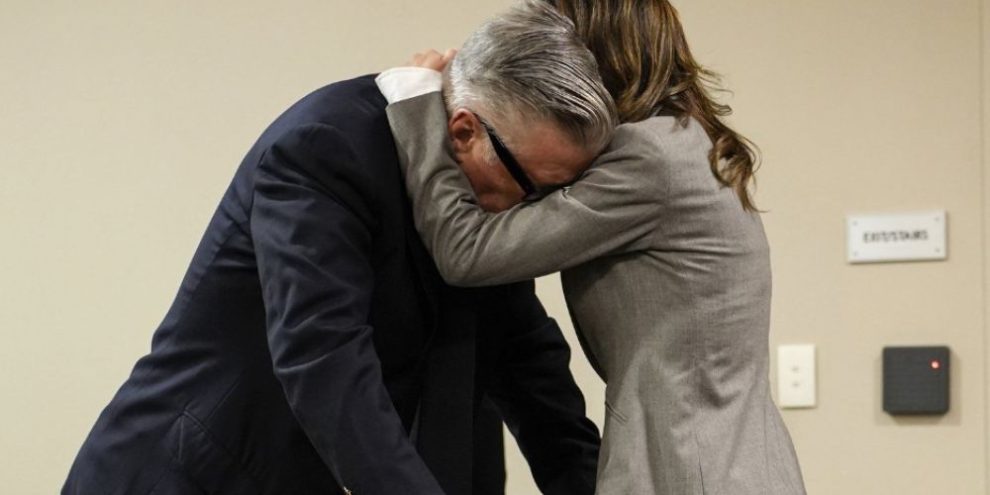
SANTA FE, N.M. (AP) — Alec Baldwin ’s involuntary manslaughter trial in New Mexico came to a sudden and surprising halt on Friday while the judge considers a defense motion to dismiss the case over disputed ammunition evidence in the killing of cinematographer Halyna Hutchins.
Judge Mary Marlowe Sommer sent the jury home for the day and told them to return Monday after what was supposed to be a short morning hearing on the matter, but raised more questions than expected and prompted her to call for further testimony outside the presence of jurors.
The defense argued that prosecutors hid evidence from them about the ammunition that may be related to the shooting on the set of the Western “Rust” in 2021. The defense said they should have had the ability to determine its importance.
“We don’t know if it’s a live ammunition match or not," Baldwin's attorney Luke Nikas told the judge. "But we do know that the state had it, and it’s disclosable.”
The prosecution has said that the ammunition was not connected to the case and was not hidden.
The issue emerged Thursday on the second day of the actor's trial during defense questioning of sheriff's crime scene technician Marissa Poppell. Baldwin lawyer Alex Spiro asked whether a “good Samaritan” had come into the sheriff's office with the ammunition earlier this year after the trial of Hannah Gutierrez-Reed, the film's armorer, for her role in Hutchins’ death. She was sentenced to 18 months in prison on an involuntary manslaughter conviction, which she is now appealing.
There has still not been a definitive determination on how the live rounds got on set. But prosecutors said photos on found on Gutierrez-Reed's cellphone point to her being responsible.
Poppell testified that at the behest of her supervisor, she accepted the ammunition, logged it and filed a report on it. But the defense said the prosecution did not group it with other evidence in the “Rust” case, and it was not included when the ballistics evidence was provided to them in April.
“They buried it,” Nikas said.
Special prosecutor Kari Morrissey established in her questioning that the man with the ammunition was Troy Teske, a retired police officer in Mohave County, Arizona, who is a friend of Thell Reed, a prominent movie armorer and Gutierrez-Reed's father.
Morrissey said the bullets were not the same size or chemical composition as the live rounds found on the “Rust” set, including the one that killed Hutchins.
“This is a wild goose chase that has no evidentiary value whatsoever," Morrissey told the judge Friday. “This is just a man trying to protect his daughter.”
But Marlowe Sommer found the issue serious enough to ask to see the evidence herself, and put on latex gloves to examine it in open court. She then called off trial for the day and asked to hear testimony from Poppell and Seth Kenney, a supplier of firearms and some of the ammunition on the film.
Kenney had been cooperative with police and prosecutors throughout their investigation. The defense have suggested that the relationship has been too cozy, and that authorities insufficiently investigated whether he was responsible for the live bullets reaching the set.
Kenney has not been charged with any wrongdoing, and police and prosecutors have said there is no evidence that he had any role in the live ammunition on the “Rust” set. His attorney did not immediately respond to an email seeking comment.
Police and prosecutors had known about Teske and his supply of ammunition since less than a month after the shooting.
Kenney had called him during an interview with the lead sheriff's investigator, Alexandria Hancock, and asked him to send a picture of the ammunition he had. The bullets in the photos did not appear to match the live rounds found on the “Rust” set.
Morrissey said that it eventually became clear to Hancock the issue was an attempt to mislead investigators by Thell Reed, who was trying to shift blame from his daughter to Kenney.
Morrissey met herself with Teske last year, but did not pursue the evidence further.
The defense suggested the evidence was obscured because it might be favorable to Baldwin.
But prosecutors have pointed out that the charge against Baldwin stems from his reckless flouting of gun safety, not an allegation that he had any part in the live ammunition reaching set.
___
Dalton reported from Los Angeles.





